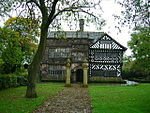Hall i' th' Wood
| Hall i' th' Wood | |
|---|---|
 Front view of Hall i' th' Wood manor house | |
| General information | |
| Architectural style | Medieval |
| Town or city | Bolton, Greater Manchester |
| Country | England |
| Coordinates | 53°36′02″N 2°25′08″W / 53.60049°N 2.41895°W |
| Completed | 16th century |
| Designations | |
Listed Building – Grade I | |
| Official name | Hall i' th' Wood |
| Designated | 22 April 1952 |
| Reference no. | 1388052 |

Hall i' th' Wood is an early 16th-century manor house in Bolton in the historic county of Lancashire and the ceremonial county of Greater Manchester, England. It is a Grade I listed building and is currently used as a museum by Bolton Metropolitan Borough Council.[1][2] It was the manor house for the moiety of the Tonge with Haulgh township held by the Brownlows in the 16th century. The original building is timber framed and has a stone flagged roof; there were later additions to the house, built from stone, in 1591 and 1648.[1] The name represents "Hall in the Wood' spoken in the local regional English dialect and is pronounced /ˌɔːlɪθˈwʊd/.
The house was not used as a gentry house but rather given over to multiple occupation by families engaged in industry. Four (previously five) separate dwellings can be identified, each with its own entrance and staircase.[3] One part was let to Samuel Crompton during the 18th century, where he designed and built the first spinning mule.[2] About 1779, Crompton succeeded in producing a mule-jenny, a machine which spun yarn suitable for use in the manufacture of muslin.[4] It was known as the muslin wheel or the Hall i' th' Wood wheel[5] from the name of the house.[6]
Hall i' th' Wood was bought by William Lever (later Lord Leverhulme) in 1899 and was restored by Jonathan Simpson and Edward Ould.[7] Lever gave the house to the Corporation of Bolton in 1900.[1]
An episode of the television programme Most Haunted was filmed in the hall in 2008.[8]
In Fisher's Drawing Room Scrap Book, 1833, is a poetical illustration by Letitia Elizabeth Landon to an engraving of a painting of the hall by William Linton.[9] This dwells on the changes the hall has seen over the centuries.
See also[edit]
- Grade I listed buildings in Greater Manchester
- Listed buildings in Bolton
- Hall i' th' Wood railway station
References[edit]
- ^ a b c Historic England. "Hall i' th' Wood, Bolton (1388052)". National Heritage List for England. Retrieved 19 July 2012.
- ^ a b Historic England. "Hall i' th' Wood (44392)". Research records (formerly PastScape). Retrieved 19 July 2012.
- ^ Hartwell, Clare. Lancashire: Manchester and the South-East. p. 153.
- ^ Baines, Edward (1835), History of the cotton manufacture in Great Britain, London: H. Fisher, R. Fisher, and P. Jackson
- ^ Baines, Edward (1835), History of the cotton manufacture in Great Britain, London: H. Fisher, R. Fisher, and P. Jackson
- ^ "Samuel Crompton 1753–1827". Retrieved 21 April 2008.
- ^ Hartwell, Clare; Hyde, Matthew; Pevsner, Nikolaus (2004), Lancashire: Manchester and the South-East, The Buildings of England, New Haven and London: Yale University Press, pp. 153–155, ISBN 0-300-10583-5
- ^ Karl Beattie and Bev Parr (directors) (2008). Most Haunted (TV-Series). Hall i' th' Wood: Antix Productions.
- ^ Landon, Letitia Elizabeth (1832). "picture". Fisher's Drawing Room Scrap Book, 1833. Fisher, Son & Co.Landon, Letitia Elizabeth (1832). "poetical illustration". Fisher's Drawing Room Scrap Book, 1833. Fisher, Son & Co.
External links[edit]
![]() Media related to Hall i' th' Wood at Wikimedia Commons
Media related to Hall i' th' Wood at Wikimedia Commons
- Hall i' th' Wood - history and visitor information, Bolton Museums and Archive Service
- Hall i' th' Wood at bolton.org
- Extract from A Short History of Hall i' th' Wood Compiled and Edited by Derek R. Mills (1992)
- Country houses in Greater Manchester
- Buildings and structures in Bolton
- Historic house museums in Greater Manchester
- Timber framed buildings in England
- Grade I listed buildings in Greater Manchester
- Grade I listed houses
- Grade I listed museum buildings
- History of Bolton
- Tourist attractions in the Metropolitan Borough of Bolton




